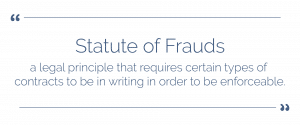

Updated on December 19, 2023
The Statute of Frauds is a legal principle that requires certain types of contracts to be in writing in order to be enforceable. The Statute of Frauds is intended to prevent fraud and misunderstandings by requiring that key terms of certain types of agreements be committed to writing and signed by the parties.
The Statute of Frauds, California Civil Code section 1624, requires certain contracts to be in writing to be enforceable. Under the statute, contracts for the sale, gift, or financing of real property must be memorialized in a writing that satisfies the statute of frauds.

It’s important to note that contracts that are subject to the statute of frauds must include specific terms, and must be signed by the party being charged or the party’s authorized agent. These requirement have to be met to be enforceable in court.
Additionally, in California, some of the contracts are excepted from the statute of frauds such as contracts formed by payment and acceptance (or part-payment),and certain contracts that are formed under seal.
It’s always a good idea to consult with a legal professional when entering into a contract that may be subject to the Statute of Frauds to make sure that the requirements are met and that the contract is enforceable.
To Satisfy the Statute of Frauds, a Real Estate Contract Must Contain the Following:
Some examples of real property contracts that come under the statute of frauds:
There may be limited instances where an agreement will be enforced despite the lack of a writing that satisfies the statute of frauds in real estate.
For example, the doctrine of part performance may permit the enforcement of an oral agreement for the sale of property that is not accompanied by a valid writing. There are specific requirements on what the buyer must do, however. In reliance on the oral agreement, the buyer must have taken possession of the property and made a full or partial payment of the purchase price, or made valuable and substantial improvements to the property. It is not enough for the buyer to show that he or she has paid the purchase price of the property; there must be sufficient part performance of the parties’ oral agreement to remove it from the purview of the statute of frauds.
The statute of frauds covers a wide range of contracts involving real property and its impact may be significant—it may be the very issue that causes a litigant to win or lose one’s case. Therefore, an analysis of the statute of frauds is virtually always required when analyzing an agreement involving real property.
Schorr Law’s Real Estate Fraud Attorneys in Los Angeles is experienced in dealing in real property disputes, including issues that may arise from the statute of frauds. To schedule a consultation, please contact real estate lawyers in Los Angeles by phone, email, or through our contact form.
Related Post: How to Avoid Real Estate Fraud: Suggestions for Buyers and Sellers